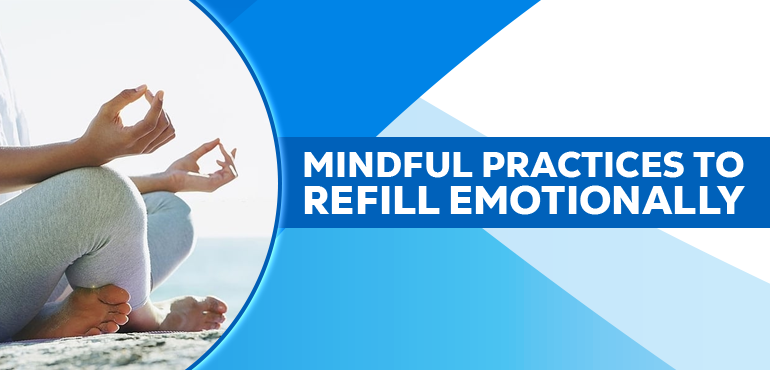Before we start this article, let’s clarify that emotional health is not the same as mental health.
Mental health is defined by the World Health Organisation (WHO) as;
“Mental well-being that enables people to cope with the stresses of life, realise their abilities, learn well and work well and contribute to their community.”
(World Health Organization, 2022)
Emotional health is more closely related to our life’s dynamics- the ebb and flow of events and circumstances that affect our emotions and thought processes:
Emotional health is the ability to control your emotions, feelings, and thoughts and withstand the whirlwind life throws at you.
Emotional wellness is being aware of your emotions and having the necessary strategies to deal with them during the constant flux of life. Individuals, social and structural determinants impact our mental and emotional health throughout our lives. It is up to us to build a system around us that can protect us from the emotional trauma. Emotional wellness is not the inability to feel the lows; it is the capacity to understand your emotions and deal with them rationally instead of projecting them in an unhealthy way.
Why is Emotional Health Important?
Having emotional wellness means you are able to bounce back from the setbacks of your life. It also plays a crucial role in how you interact with your peers, your ability to take criticism and deal with conflicting challenges in everyday life. Emotional intelligence fosters growth, resilience, and self-awareness. If not taken seriously, emotional health can cause physical symptoms, we have all experienced uneasiness or even nausea under stressful conditions. However, avoiding signs of emotional decline for extended periods can result in mental health issues, heart problems, and poor gut health (Healthline, 2019).
Practices that are Emotionally Draining
Emotional exhaustion is a result of chronic stress caused work-life imbalance, increased conflict, overwhelming demand at work or in personal life, and a lack of support system. Perhaps, the biggest contributor to emotional strain in our fast-paced life is stress. Whether we like it or not, stress is a part of our lives, now more so than ever before. It is essential to recognise these stressors in your life and manage them accordingly. Besides stress, a few other factors that may be destroying your emotional health such as:
- Inadequate work-life balance, which starts to affect your personal life
- Less time for relaxation
- Not making time for hobbies or activities that you enjoy
- Living in a conflicting environment
- Having an emotionally manipulating social circle
Signs you are Emotionally Exhausted
Dealing with emotionally draining situations every day can reduce your sense of well-being, leading to emotional exhaustion. Unchecked emotional exhaustion can trigger burnout. Emotional burnout emerges when a person depletes their emotional resources trying to deal with the hassles of everyday life. It is characterised by low energy and lack of motivation to perform everyday tasks. Emotionally burnt-out people have a hard time engaging in activities they once loved to perform. Several signs that are common in burnt-out individuals are:
- Feelings of hopelessness
- Unable to resolve your issues
- Low energy to perform everyday chores
- Low motivation and concentration
- High emotional reactivity like aggressiveness, irritation, and frustration
- Physical manifestations like fatigue, headache, reduced appetite, and body aches
(Harvard Business Review, 2020)
3 Mindful Practices to Emotionally Refill Yourself
It is hard to be enthusiastic about anything when you are exhausted and burnt out. The overwhelming responsibilities, financial difficulties, chronic illness, or other reasons may make you feel like you have little to nothing to offer to your loved ones.
(Godman, 2023)
But worry not!
Here are some strategies that can get your joie de vivre back so you can once again live life to the fullest.
- Indulge your emotions
Once in a while, take time out for yourself. Give your mind some time to rest and rejuvenate to perform at its best. If it seems impossible, start by scheduling 10-15 minutes daily. Use this time to reflect on your day, process the emotions you felt that day, and gather your thoughts. A great way of reducing anxiety and regulating emotions is through meditation(Tang, Tang and Posner, 2016). Instead of socialising on the weekend, take some time to meditate. Start small, and take time to look at the most recent problems that bother you the most. Make a mental note of these issues, and look retrospectively. You will find a pattern, and now you can determine the root cause of your problem. This practice will help you pluck out the issues that are detrimental to your emotional health and find healthier ways to deal with similar situations.
- Refrain from a Toxic Social Circle
Having a social life is vital to have good mental and emotional health. But it is equally important to recognise the red flags in those around you. Cut off those people that are draining your emotional resources, leaving you with a big void. Give yourself permission to say ‘no, thank you’ to people that deplete your energy or don’t serve you.
Having said that, a healthy social life is also important for your well-being. Surround yourself with people that support you, inspire you to grow, and energise you.
- Surround yourself with Positivity
Living in a situation of constant stress, worry, and conflict can agitate your energy levels. You may feel overwhelmed or on edge, a telltale sign that you are approaching the point of emotional exhaustion.
In a position like this, the Hygge lifestyle is the best cure. Hygge lifestyle promotes spending time with friends, family, or by yourself doing things you enjoy the most. Stop for a day, write your chores on a to-do list and forget about them, light a scented candle (or fairy lights), and watch a movie, read a book, or have dinner with your family (Ladores, Billings and Polen, 2022). Surround yourself with comfort and feed the inner child in you!
By following these practices, you will realise you are giving yourself something you haven’t had for a while: Time. Time for yourself, so you can enjoy life’s simple pleasures, reflect on your thoughts and actions, and create a life surrounded by people who truly wish the best for you. Planting is also a great way to relax your senses. It give your the N (natural) vitamin. Nourish your mind and replenish your emotional cup so you can continue refilling the cups of those closest to you.
References:
- World Health Organization (2022). Mental health: Strengthening Our Response. [online] World Health Organization. Available at: https://www.who.int/news-room/fact-sheets/detail/mental-health-strengthening-our-response.
- Healthline. (2019). Emotional Health: Why It’s as Important as Physical Health. [online] Available at: https://www.healthline.com/health/emotional-health#examples.
- Harvard Business Review. (2020). How to Refuel When You’re Feeling Emotionally Drained. [online] Available at: https://hbr.org/2020/04/how-to-refuel-when-youre-feeling-emotionally-drained.
- Godman, H. (2023). Pouring from an empty cup? Three ways to refill emotionally. [online] Harvard Health. Available at: https://www.health.harvard.edu/blog/pouring-from-an-empty-cup-three-ways-to-refill-emotionally-202301262882 [Accessed 15 Feb. 2023].
- Tang, Y.-Y., Tang, R. and Posner, M.I. (2016). Mindfulness meditation improves emotion regulation and reduces drug abuse. Drug and Alcohol Dependence, 163, pp.S13–S18.
- Ladores, S., Billings, R. and Polen, M. (2022). Using Hygge to Promote Wellness and Coping With a Chronic Illness. Creative Nursing, 28(4), pp.279–282.

